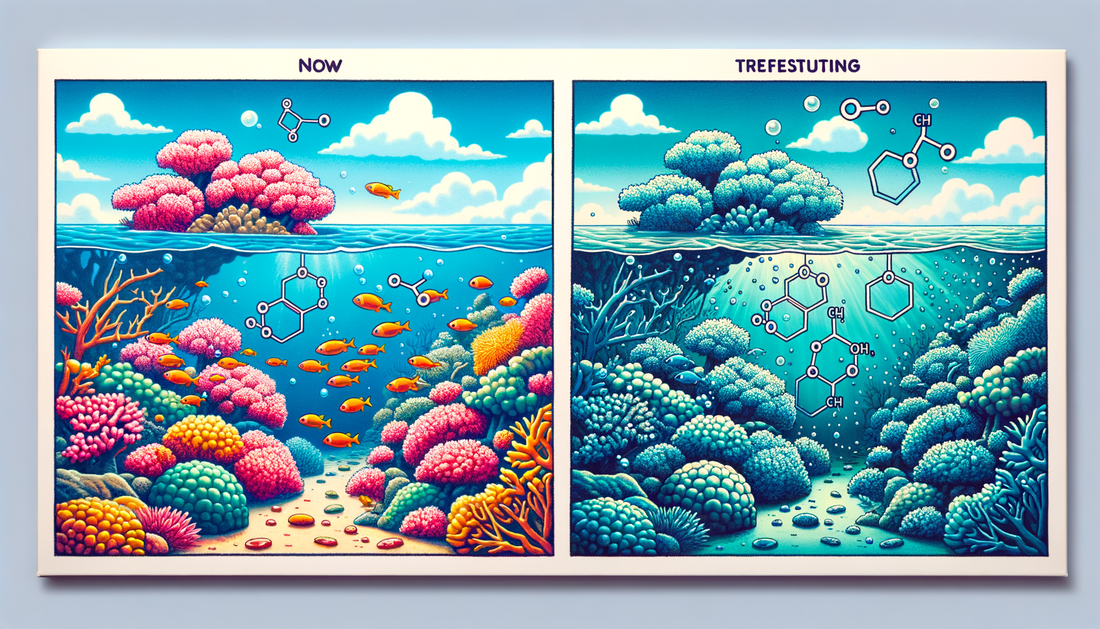
What Is Ocean Acidification and its impact to Coral Reefs
Share
The Impact of Ocean Acidification on Coral Reefs: Current Research and Findings
Reading Time: 10 minutes
Table of Contents
1. Introduction
2. What is Ocean Acidification?
3. How does Ocean Acidification affect Coral Reefs, Marine Wildlife, and Marine Mammals?
4. Current Research and Findings
5. The Role of Marine Science in Combating Ocean Acidification
6. The Contribution of Climate Change and Global Warming
7. The Effects of Polluting Oceans and Micro Plastics in the Ocean
8. Sea Level Rise: A Result of Climate Change?
9. About Seacret
10. How Can You Make a Difference?
Introduction
Coral reefs, the rainforests of the ocean, are incredibly biodiverse ecosystems with a vast array of marine life. However, our beautiful oceans are under threat. We will explore one of the significant threats that they face: Ocean Acidification. In this blog post, we will discuss the impact of acidification and how it affects our coral reefs, marine wildlife, and marine mammals.
What is Ocean Acidification?
Ocean Acidification is a direct result of increased carbon dioxide (CO2) emissions. As more CO2 enters our atmosphere, our oceans absorb significant portions, leading to acidic water. This increase in acidity has severe implications for the health of our oceans and marine life.How does Ocean Acidification affect Coral Reefs, Marine Wildlife, and Marine Mammals?
Ocean acidification disrupts the delicate equilibrium of marine life in many ways. Coral reefs, for example, face increasing difficulties in their calcium carbonate structures' growth and maintenance due to acidification, these calcium carbonate structure's are their skeletons. This disruption of the growth process poses a significant risk to reefs and the marine life they support. The impact extends to marine wildlife and mammals, with some species - notably those whose shells or skeletons are stabilised by calcium carbonate - experiencing negative effects from the more acidic seawater, dissolution of calcium structures due to a decrease in pH, making the aqueous environment more acidic.Current Research and Findings
Scientists and researchers in the field of marine biology are continually seeking to broaden our understandings of this pressing issue. Current research reveals that acidification rates are unparalleled in the Earth's history. Without intervention, our ocean's chemistry could change irreversibly, with catastrophic outcomes on marine life. Visit NOAA (National Oceanic and Atmospheric Administration) to learn more about current research and findings in ocean acidification.The Role of Marine Science in Combating Ocean Acidification
Marine science plays a pivotal role in our understanding and combatting ocean acidification. By studying the intricate phenomena that occur in the world's oceans, scientists can develop strategies to protect these vital habitats and preserve biodiversity. The field has made significant strides in recent years, with efforts such as Mote Marine Laboratory's groundbreaking work on how to make corals more resistant to acidification.The Contribution of Climate Change and Global Warming
Climate change and global warming go hand in hand with ocean acidification. The same greenhouse gas emissions causing our planet to warm are also making our oceans increasingly acidic. This presents not only an immense threat to our ecosystems but also to us humans who rely on the ocean for food, commerce, and even the air we breathe.The Effects of Polluting Oceans and Micro Plastics in the Ocean
Pollution compounds the harm caused to our oceans. Micro plastics in the ocean constitute a particularly detrimental form of pollution. These tiny particles are consumed by marine creatures, leading to various health problems, and may make their way up the food chain to our dining tables.Sea Level Rise: A Result of Climate Change?
Sea Level Rise is a direct outcome of global warming, with warming oceans leading to their expansion. Additionally, melting polar ice contributes to rising sea levels. The impact of rising sea levels is far-reaching, including flooding coastal cities and creating climate refugees, thus magnifying the human cost of climate change.About Seacret
We at Seacret are passionate about our oceans and the life they support. We demonstrate this passion by creating sustainable ocean-inspired clothing that makes a real-world impact. All our garments are organic, with plastic-free packaging, showcasing our commitment to being an environmentally-friendly fashion brand. We partner with Cleanhub and Eden Reforestation, a testament to our dedication to marine conservation and ocean protection. Visit our store at Seacret and explore our range of super comfy hoodies, ethical tees, and more. Every order made online for our men's and women's clothes supports our efforts to make sustainable changes, one garment at a time.How Can You Make a Difference?
The state of our oceans might seem daunting, but there are ways that we all can contribute to ocean conservation. From making conscientious decisions about the seafood we consume, reducing our plastic use, to supporting sustainable brands like Seacret, every step taken matters. It's time for us, collectively, to protect our precious oceans.
Each of us has the power to make a difference. Let's ensure the future of our oceans is a bright one, for they hold the key to our existence on this beautiful planet.
Related Reading
4. Travel Tips
Shop Seacret
Head over to our sustainable store, all our apparel is designed for ocean lovers and ocean themed. Help us grow and hit our impact goals by joining our fast growing community and wear what you love. Shop Now
